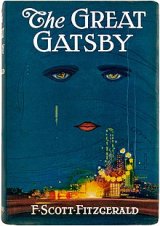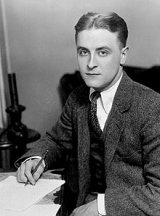The Great Gatsby Page #26
The Great Gatsby is a 1925 novel by American writer F. Scott Fitzgerald. Set in the Jazz Age on Long Island, near New York City, the novel depicts first-person narrator Nick Carraway's interactions with mysterious millionaire Jay Gatsby and Gatsby's obsession to reunite with his former lover, Daisy Buchanan. The novel was inspired by a youthful romance Fitzgerald had with socialite Ginevra King, and the riotous parties he attended on Long Island's North Shore in 1922
day after that, and the next thirty years?” “Don’t be morbid,” Jordan said. “Life starts all over again when it gets crisp in the fall.” “But it’s so hot,” insisted Daisy, on the verge of tears, “and everything’s so confused. Let’s all go to town!” Her voice struggled on through the heat, beating against it, moulding its senselessness into forms. “I’ve heard of making a garage out of a stable,” Tom was saying to Gatsby, “but I’m the first man who ever made a stable out of a garage.” “Who wants to go to town?” demanded Daisy insistently. Gatsby’s eyes floated toward her. “Ah,” she cried, “you look so cool.” Their eyes met, and they stared together at each other, alone in space. With an effort she glanced down at the table. “You always look so cool,” she repeated. She had told him that she loved him, and Tom Buchanan saw. He was astounded. His mouth opened a little, and he looked at Gatsby, and then back at Daisy as if he had just recognized her as someone he knew a long time ago. “You resemble the advertisement of the man,” she went on innocently. “You know the advertisement of the man—” “All right,” broke in Tom quickly, “I’m perfectly willing to go to town. Come on—we’re all going to town.” He got up, his eyes still flashing between Gatsby and his wife. No one moved. “Come on!” His temper cracked a little. “What’s the matter, anyhow? If we’re going to town, let’s start.” His hand, trembling with his effort at self-control, bore to his lips the last of his glass of ale. Daisy’s voice got us to our feet and out on to the blazing gravel drive. “Are we just going to go?” she objected. “Like this? Aren’t we going to let anyone smoke a cigarette first?” “Everybody smoked all through lunch.” “Oh, let’s have fun,” she begged him. “It’s too hot to fuss.” He didn’t answer. “Have it your own way,” she said. “Come on, Jordan.” They went upstairs to get ready while we three men stood there shuffling the hot pebbles with our feet. A silver curve of the moon hovered already in the western sky. Gatsby started to speak, changed his mind, but not before Tom wheeled and faced him expectantly. “Have you got your stables here?” asked Gatsby with an effort. “About a quarter of a mile down the road.” “Oh.” A pause. “I don’t see the idea of going to town,” broke out Tom savagely. “Women get these notions in their heads—” “Shall we take anything to drink?” called Daisy from an upper window. “I’ll get some whisky,” answered Tom. He went inside. Gatsby turned to me rigidly: “I can’t say anything in his house, old sport.” “She’s got an indiscreet voice,” I remarked. “It’s full of—” I hesitated. “Her voice is full of money,” he said suddenly. That was it. I’d never understood before. It was full of money—that was the inexhaustible charm that rose and fell in it, the jingle of it, the cymbals’ song of it … High in a white palace the king’s daughter, the golden girl … Tom came out of the house wrapping a quart bottle in a towel, followed by Daisy and Jordan wearing small tight hats of metallic cloth and carrying light capes over their arms. “Shall we all go in my car?” suggested Gatsby. He felt the hot, green leather of the seat. “I ought to have left it in the shade.” “Is it standard shift?” demanded Tom. “Yes.” “Well, you take my coupé and let me drive your car to town.” The suggestion was distasteful to Gatsby. “I don’t think there’s much gas,” he objected. “Plenty of gas,” said Tom boisterously. He looked at the gauge. “And if it runs out I can stop at a drugstore. You can buy anything at a drugstore nowadays.” A pause followed this apparently pointless remark. Daisy looked at Tom frowning, and an indefinable expression, at once definitely unfamiliar and vaguely recognizable, as if I had only heard it described in words, passed over Gatsby’s face. “Come on, Daisy” said Tom, pressing her with his hand toward Gatsby’s car. “I’ll take you in this circus wagon.” He opened the door, but she moved out from the circle of his arm. “You take Nick and Jordan. We’ll follow you in the coupé.” She walked close to Gatsby, touching his coat with her hand. Jordan and Tom and I got into the front seat of Gatsby’s car, Tom pushed the unfamiliar gears tentatively, and we shot off into the oppressive heat, leaving them out of sight behind. “Did you see that?” demanded Tom. “See what?” He looked at me keenly, realizing that Jordan and I must have known all along. “You think I’m pretty dumb, don’t you?” he suggested. “Perhaps I am, but I have a—almost a second sight, sometimes, that tells me what to do. Maybe you don’t believe that, but science—” He paused. The immediate contingency overtook him, pulled him back from the edge of theoretical abyss. “I’ve made a small investigation of this fellow,” he continued. “I could have gone deeper if I’d known—” “Do you mean you’ve been to a medium?” inquired Jordan humorously. “What?” Confused, he stared at us as we laughed. “A medium?” “About Gatsby.” “About Gatsby! No, I haven’t. I said I’d been making a small investigation of his past.” “And you found he was an Oxford man,” said Jordan helpfully. “An Oxford man!” He was incredulous. “Like hell he is! He wears a pink suit.” “Nevertheless he’s an Oxford man.” “Oxford, New Mexico,” snorted Tom contemptuously, “or something like that.” “Listen, Tom. If you’re such a snob, why did you invite him to lunch?” demanded Jordan crossly. “Daisy invited him; she knew him before we were married—God knows where!” We were all irritable now with the fading ale, and aware of it we drove for a while in silence. Then as Doctor T. J. Eckleburg’s faded eyes came into sight down the road, I remembered Gatsby’s caution about gasoline. “We’ve got enough to get us to town,” said Tom. “But there’s a garage right here,” objected Jordan. “I don’t want to get stalled in this baking heat.” Tom threw on both brakes impatiently, and we slid to an abrupt dusty stop under Wilson’s sign. After a moment the proprietor emerged from the interior of his establishment and gazed hollow-eyed at the car. “Let’s have some gas!” cried Tom roughly. “What do you think we stopped for—to admire the view?” “I’m sick,” said Wilson without moving. “Been sick all day.” “What’s the matter?” “I’m all run down.” “Well, shall I help myself?” Tom demanded. “You sounded well enough on the phone.” With an effort Wilson left the shade and support of the doorway and, breathing hard, unscrewed the cap of the tank. In the sunlight his face was green. “I didn’t mean to interrupt your lunch,” he said. “But I need money pretty bad, and I was wondering what you were going to do with your old car.” “How do you like this one?” inquired Tom. “I bought it last week.” “It’s a nice yellow one,” said Wilson, as he strained at the handle. “Like to buy it?” “Big chance,” Wilson smiled faintly. “No, but I could make some money on the other.” “What do you want money for, all of a sudden?” “I’ve been here too long. I want to get away. My wife and I want to go
Translation
Translate and read this book in other languages:
Select another language:
- - Select -
- 简体中文 (Chinese - Simplified)
- 繁體中文 (Chinese - Traditional)
- Español (Spanish)
- Esperanto (Esperanto)
- 日本語 (Japanese)
- Português (Portuguese)
- Deutsch (German)
- العربية (Arabic)
- Français (French)
- Русский (Russian)
- ಕನ್ನಡ (Kannada)
- 한국어 (Korean)
- עברית (Hebrew)
- Gaeilge (Irish)
- Українська (Ukrainian)
- اردو (Urdu)
- Magyar (Hungarian)
- मानक हिन्दी (Hindi)
- Indonesia (Indonesian)
- Italiano (Italian)
- தமிழ் (Tamil)
- Türkçe (Turkish)
- తెలుగు (Telugu)
- ภาษาไทย (Thai)
- Tiếng Việt (Vietnamese)
- Čeština (Czech)
- Polski (Polish)
- Bahasa Indonesia (Indonesian)
- Românește (Romanian)
- Nederlands (Dutch)
- Ελληνικά (Greek)
- Latinum (Latin)
- Svenska (Swedish)
- Dansk (Danish)
- Suomi (Finnish)
- فارسی (Persian)
- ייִדיש (Yiddish)
- հայերեն (Armenian)
- Norsk (Norwegian)
- English (English)
Citation
Use the citation below to add this book to your bibliography:
Style:MLAChicagoAPA
"The Great Gatsby Books." Literature.com. STANDS4 LLC, 2025. Web. 26 Feb. 2025. <https://www.literature.com/book/the_great_gatsby_1598>.








Discuss this The Great Gatsby book with the community:
Report Comment
We're doing our best to make sure our content is useful, accurate and safe.
If by any chance you spot an inappropriate comment while navigating through our website please use this form to let us know, and we'll take care of it shortly.
Attachment
You need to be logged in to favorite.
Log In